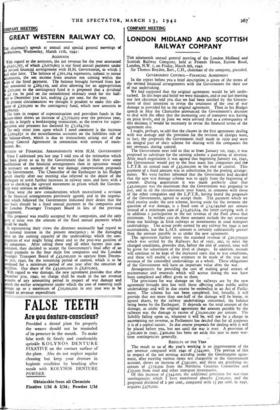COMPANY MEETING
LONDON MIDLAND AND SCOTTISH RAILWAY COMPANY
THE nineteenth annual general meeting of the London Midland and Scottish Railway Company, held at Friends House, Euston Road, London, N.W. I, on Friday, March 6th, 1942.
Sir Thomas Royden, Bart., C.H., chairman of the company, presided.
GOVERNMENT CONTROL—FINANCIAL AGREEMENT In the report before you a brief description is given of the terms of the revised financial arrangements with the Government for their use of our undertaking.
We had supposed that the original agreement would be left undis- turbed. In this hope and belief we were mistaken, and at our last meeting our late chairman told you that we had been notified by the Govern- ment of their intention to revise the treatment of the cost of war damage as provided for in the original agreement. Then in his Budget speech in May the Chancellor announced the Government's decision to deal with the effect that the increasing cost of transport was having on price levels, and in June we were advised that as a consequence of this decision it would be necessary to revise the financial terms of the agreement also.
I ought, perhaps, to add that the clauses in the first agreement dealing with war damage and the provision for the revision of charges were, in fact, the proposals the Government itself made in 1939 and were an integral part of their scheme for sharing with the companies the net revenues during control.
The Government next told us that as from January 1st, 1941, it was proposed to substitute for the existing scheme a guarantee of "revenue. After much negotiation it was agreed that beginning January 1st, 1941, the Government would pay to the four main line companies and the L.P.T.B. an annual sum of £43,oco,00o to the end of control. This payment of a fixed amount was in substitution for the pooling arrange- ments. We were further informed that the Government had decided that the new war damage scheme was to apply from the beginning of control. During negotiation it was made perfectly clear that £43,00o,000 was the maximum that the Government was prepared to pay, and in all the circumstances your board, in common with those of the other companies and the L.P.T.B., having heard the proposals of the Government, agreed to accept them. The payment which we shall receive under the new scheme, leaving aside for the moment the question of war damage, is a fixed sum of £14,749,698 per annum instead of a minimum sum of £13,465,624, the latter carrying with it in addition a participation in the net revenue of the Pool above that minimum. In neither case do these amounts include the net revenue from our holdings in Irish railways or investments in road transport undertakings. 'I he actual profit earned by any railway for 1941 is not ascertainable, but the L.M.S. amount is certainly substantially greater than the amount payable to us under the new agreement.
The agreement further notes the standard revenue of £20,579,930 which was settled by the Railways Act of 1921, and, to meet the changed conditions, provides that, before the end of control, time will be given for adjustment of the level of charges. In addition, records will continue to be kept of the increased costs due to war conditions, and these will enable a close estimate to be made of the true net revenue of the controlled undertakings as a whole. These obligations of the Government will have an important value after the war.
Arrangements for providing the cost of making good arrears of maintenance and renewals which will accrue during the war have been completed and effect given to them.
The provisions for war damage on the railways are by the new agreement' brought into line with those affecting other public utility undertakings and will in due course be embodied in an Act of Parlia- ment. The scheme has not been completed, but, broadly, it will provide that not more than one-half of the damage will be borne, in agreed shares, by the railway undertakings concerned, the balance being borne by the Exchequer. It depends on the total amount of the damage, as under the original agreement the amount payable by the railways was the damage in excess of Lio,000,000 per annum. The liability falling upon us, whatever it will be, will not be a charge in ascertaining net revenue, as Parliament has deeded that for all purposes it is of a capital nature. In due course proposals for dealing with it will be placed before you, but not until the war is over. A provision of k300,000 in 1940, £400,000 has been set aside this year to meet war- time contingencies generally.
RESULTS OF THE YEAR The result to us of the year's working is an improvement of the net revenue compared with 194o of £544,000. The portion of this in respect of the net revenue accruing under the Government agree- ment, after meeting various items not chargeable to the Government account, shows an increase of £340,000, and there are gratifying in- creases of £172,000 from the Northern Counties Committee and £32,000 from road and other transport investments.
Of this increase of £544,000, the additional provision for war-time contingencies which I have mentioned absorbs £100,000, and the proposed dividend of 2 per cent., compared with if per cent. in 1941, requires £476,000.


























 Previous page
Previous page